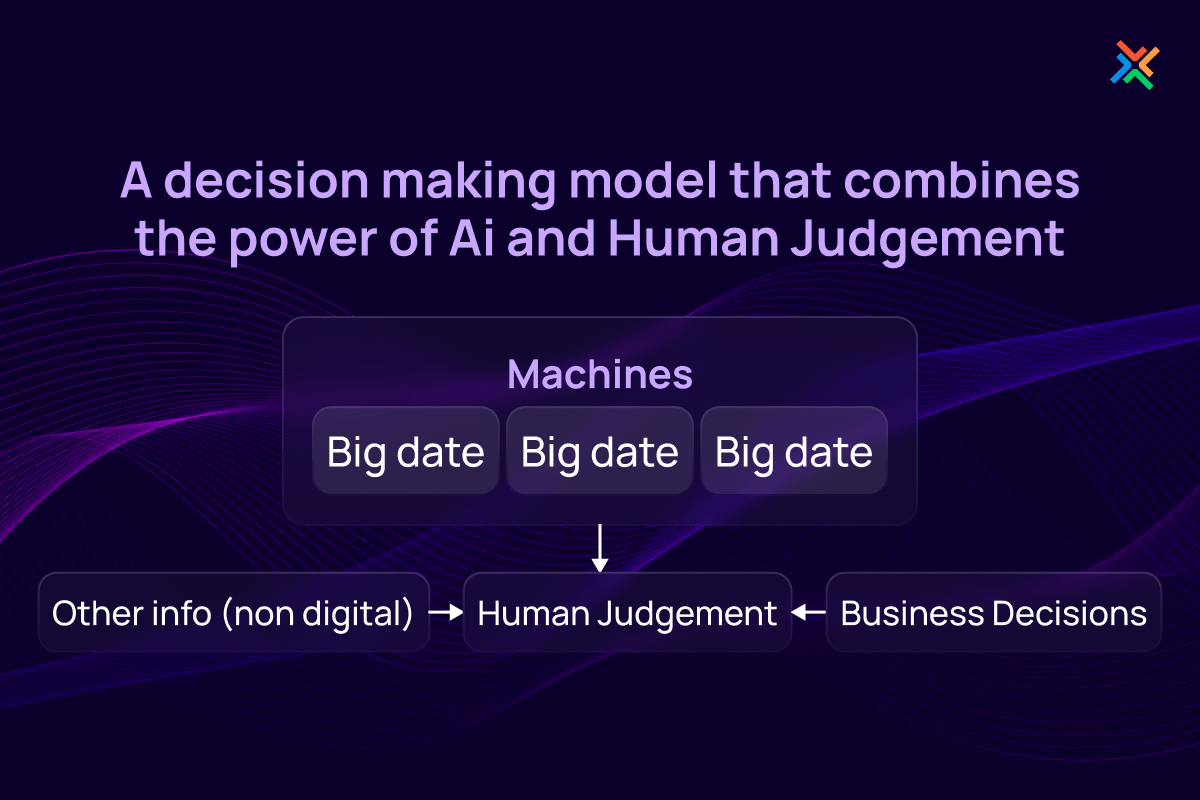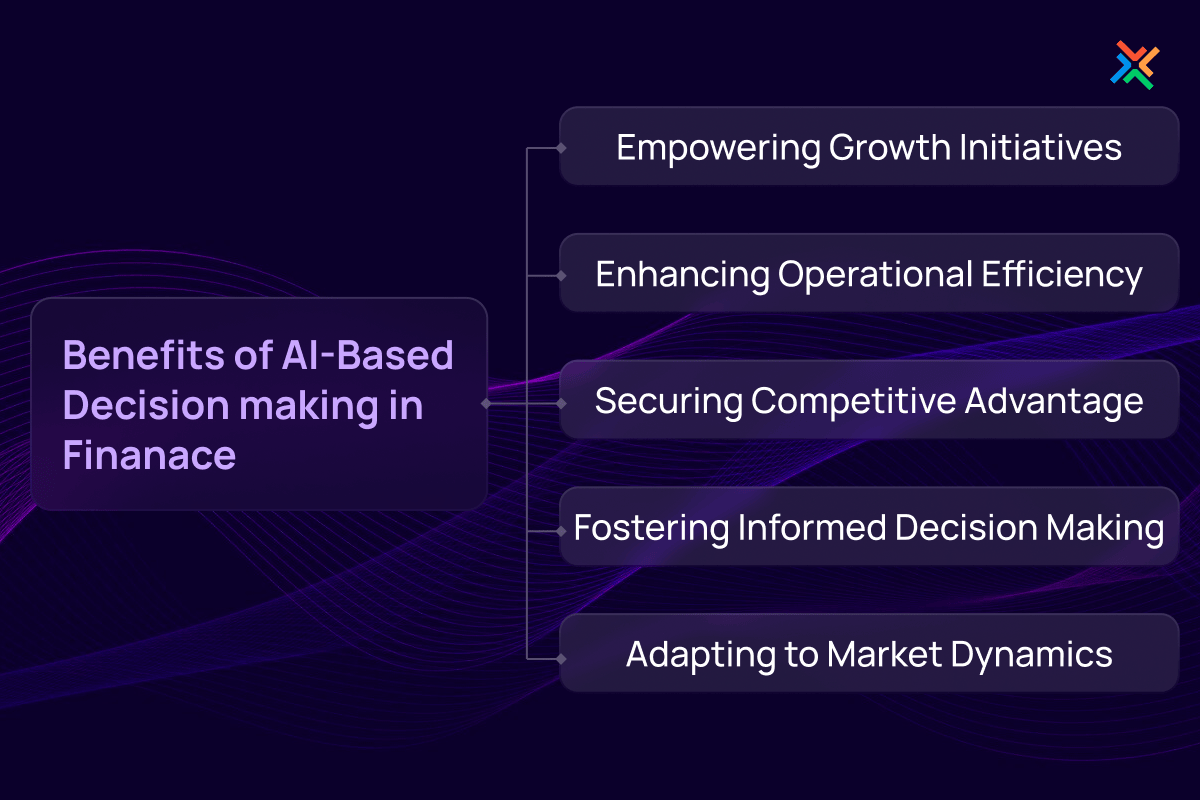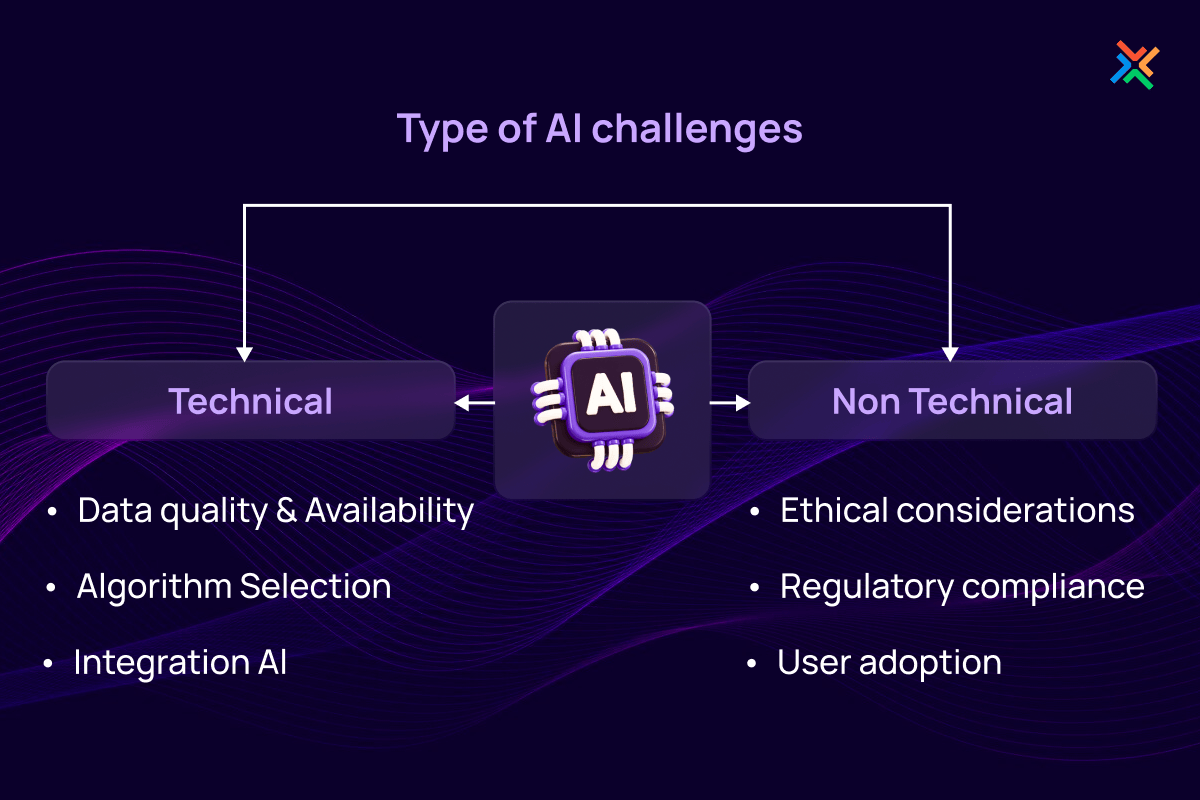How AI is Revolutionizing Business Decision-Making in 2025
October 30, 2024

Ayush Kanodia
.png?w=1920&q=75)
In 2025, it's no secret that AI is changing how we do things. Businesses across the board are using it to make decisions, from big companies to small startups. But why is AI so important?
Traditionally, business decision-making has been bogged down by a few persistent challenges. Data processing takes time, human judgment can be biased, and information is often isolated across departments. These issues slow down operations and limit the ability to make well-informed decisions when time is of the essence.
AI development services in the UAE present the potential to resolve this. By automating data analysis, providing unbiased recommendations, and connecting various sources of information, AI offers businesses the tools to cut through the noise and make decisions based on real insights, not just gut feelings. AI’s strength lies in its ability to handle massive amounts of data quickly and deliver actionable outcomes, giving businesses a sharper edge.

At WDCS Technology, we’re a leading AI development company in the UAE. We’re not just talking about AI; we’re actively building and implementing solutions that address these decision-making hurdles. From predictive models to AI-driven process optimizations, our expertise is helping companies make smart choices, faster.
The Evolution of AI in Business Decision-Making
AI Development service in the UAE have come a long way in business, evolving from simple automation tools to sophisticated systems that can actively support decision-making. In the early days, AI was mainly used to automate repetitive tasks, such as basic data entry or handling routine customer queries. Then came the introduction of analytics, which allowed businesses to make sense of large amounts of data, but still required humans to interpret those insights and make decisions.
Fast forward to today, AI doesn’t just analyze data; it helps businesses make decisions based on that data. We’re now seeing AI systems that can identify patterns, predict outcomes, and offer recommendations without much human intervention. AI has evolved from a tool for efficiency to becoming an efficient decision-making ally.
From 2023 to 2025, we’ve seen a few key developments that have really pushed AI adoption in business. Reinforcement learning, where systems learn through trial and error to improve their performance, is helping companies in everything from supply chain logistics to financial forecasting. Generative AI, which can create new content or designs based on past data, is being used in creative fields and product development. And quantum computing, while still in its early stages, promises to supercharge AI’s ability to solve complex problems much faster than before.
Of course, none of this would be possible without advancements in data handling. Companies are now collecting more data than ever, and the way this data is stored and processed has changed dramatically. AI-powered data lakes and cloud platforms allow businesses to access and process data in real-time, helping them make decisions faster and with more accuracy. It’s not just about having data; it’s about using it effectively—and that’s where AI shines.
Core Technologies Driving AI in 2025
As AI continues to grow in its role within business decision-making, several core technologies are leading the charge in 2025. These technologies are not just improving how businesses process data but are fundamentally changing how decisions are made—quickly, accurately, and with minimal human intervention.
Natural Language Processing (NLP) for Decision Intelligence
Natural Language Processing (NLP) has become one of the most valuable tools for making sense of unstructured data. Think about all the emails, reports, social media posts, and documents businesses deal with daily. Much of this data is written in natural language, which traditionally has been hard for machines to process. Systems like GPT-4 and its successors have made it possible for AI to sift through this information, identify key insights, and present actionable suggestions. For example, companies use NLP to analyze customer feedback in real time, helping them adjust strategies based on sentiment or detect emerging trends buried in everyday communication.
Predictive Analytics and AI-Powered Forecasting
Using historical data, AI models can now predict future outcomes with impressive accuracy. This isn’t limited to just sales projections or inventory management—predictive analytics is being applied to everything from customer behavior to market fluctuations. Businesses rely on these models to forecast demand, optimize operations, and prepare for future risks. With AI’s ability to analyze large datasets and recognize patterns that humans might miss, these forecasts have become a key part of strategic planning.
Reinforcement Learning for Autonomous Decision-Making
Reinforcement learning is another powerful technology gaining traction in 2025. In simple terms, it allows AI systems to learn from their own actions by receiving feedback and adjusting accordingly. Unlike traditional models, which require human input to make decisions, reinforcement learning systems can make independent decisions in real time. These applications are particularly useful in industries like logistics, where AI can optimize routes for delivery trucks or adjust supply chain operations based on real-time data without needing human intervention.
Integration with Edge Computing
AI is also moving closer to the source of data thanks to edge computing. Rather than sending all data back to the cloud for processing, businesses are deploying AI models on edge devices, such as sensors or local machines. This makes it possible to make decisions on the spot, without waiting for data to travel back and forth from a remote server. In manufacturing, for example, edge-based AI systems can immediately respond to equipment failures, reducing downtime and keeping operations running smoothly. By processing data locally, these systems can act quickly, which is crucial in situations where time-sensitive decisions are required.
AI-Powered Decision-Making Frameworks in Different Business Domains
AI has found its way into various areas of business, where it helps make decisions faster, smarter, and with less guesswork. From supply chains to customer service, finance, marketing, and HR, AI is changing how decisions are made across the board.
Supply Chain Optimization
Managing a supply chain involves a lot of moving parts, and AI has become an essential tool for keeping everything on track. Predictive maintenance, for example, allows businesses to anticipate when equipment might fail, helping avoid costly downtime. In logistics, AI is used to forecast demand so that companies can adjust inventory levels and avoid overstocking or shortages. It can also optimize delivery routes, factoring in real-time traffic and weather conditions to reduce delays and lower costs. These AI-driven insights help supply chains run more smoothly and efficiently.
Customer Experience (CX) Enhancement
Customer experience has become a key focus for businesses, and AI is playing a huge role in improving it. By analyzing customer data—whether it’s past purchases, browsing habits, or social media activity—AI can build detailed profiles of individual customers. These profiles help businesses predict what a customer might want next, allowing them to offer personalized recommendations and real-time engagement. Whether it's a chatbot providing instant assistance or an AI system guiding a customer through their purchase journey, the experience feels more personalized to the individual. This level of personalization helps build stronger customer relationships and improves overall satisfaction.

Financial Decision-Making
In the financial sector, AI is helping businesses make more informed decisions when it comes to risk analysis, fraud detection, and investments. AI models can process large amounts of financial data to identify patterns that humans might miss. For example, AI-driven risk analysis tools can evaluate creditworthiness or predict potential market shifts. Fraud detection systems can quickly flag suspicious activity by comparing it to typical transaction patterns. On the investment side, AI is being used to support decision-making by analyzing market data and providing recommendations based on trends and predictions. These tools help financial institutions make decisions faster while reducing risks.
Marketing and Sales
AI is making marketing and sales more efficient by taking the guesswork out of customer targeting and campaign optimization. AI systems can analyze consumer behavior to segment customers into specific groups based on their preferences, habits, and demographics. This helps businesses customize their marketing efforts more precisely. Predictive models can also forecast which marketing strategies are most likely to lead to sales, helping businesses allocate their budgets more effectively. In sales, AI can predict future performance and identify leads that are most likely to convert, giving sales teams an edge when it comes to closing deals.
HR and Talent Management
AI is helping companies in the HR space too. AI-driven recruitment tools can skim through hundreds of applications, identifying the most qualified candidates based on predefined criteria. This speeds up the hiring process and helps reduce bias in recruitment. Once employees are on board, AI can monitor performance, identifying top performers or those who might need additional support. AI can also play a role in employee retention, analyzing data to identify factors that contribute to employee turnover and suggesting ways to improve satisfaction and engagement. These AI systems allow HR departments to make more informed decisions when it comes to hiring and managing talent.
The Ethical and Operational Challenges of AI in Decision-Making
While AI development service providers in the UAE brings a lot of benefits to business decision-making, it also introduces some challenges, particularly around ethics and operations. As AI takes on a bigger role in shaping decisions, there are important concerns that need to be addressed—things like bias, data privacy, and transparency.

Ethical AI and Bias Mitigation
One of the major ethical concerns with AI is bias. Because AI systems learn from historical data, they can sometimes inherit and even amplify the biases present in that data. This can lead to unfair or discriminatory outcomes, especially in sensitive areas like hiring, lending, or even law enforcement. To address this, responsible AI frameworks focus on fairness and transparency. This means designing AI systems that actively check for bias and ensure that decisions are based on objective data, not historical prejudices. Regular audits and diverse data sets are some ways businesses can reduce bias in their AI models.
Data Privacy and Security Concerns
Another big challenge is data privacy and security. With more and more data being collected to fuel AI systems, companies are facing growing concerns about how that data is stored and used. Regulations like GDPR in Europe and CCPA in California set strict guidelines on how personal data must be handled. AI systems need to comply with these regulations while still being able to process data effectively. This can be a delicate balance, but businesses are increasingly adopting privacy-first approaches, such as data anonymization and encryption, to protect sensitive information without slowing down operations.
Explainability of AI Models
As AI systems become more complex, the need for explainability becomes crucial. Businesses rely on AI to make decisions in high-stakes situations, but if the model’s decisions are a "black box," it can be difficult to understand why certain choices were made. This lack of transparency can be risky, especially in industries where accountability is critical, such as healthcare or finance. Interpretable AI models—those that provide clear explanations of their decisions—help bridge this gap. Businesses can then trust that their AI systems are not just accurate but also accountable, making sure decisions can be justified and understood.
WDCS’s Role
At WDCS, we take these ethical and operational challenges seriously. Our AI solutions are built with fairness, transparency, and security at their core. We work to ensure that our models are interpretable and bias-aware, and we stay up-to-date with data privacy regulations to help businesses maintain compliance. We believe that responsible AI isn’t just good ethics—it’s good business, and it’s how we approach every project we take on.
Measurable Impact of AI-Driven Decision-Making in Business
When it comes to AI in business, the real value lies in measurable outcomes. While AI is often talked about in terms of potential, the numbers tell the true story of its effectiveness. Businesses that have adopted AI for decision-making look at several key metrics to gauge its impact: return on investment (ROI), decision-making speed, and accuracy.
Key Metrics to Assess AI’s Impact
- ROI: The most obvious metric is the return on investment. How much value has the AI system generated compared to its cost? Whether through cost savings, increased revenue, or optimized operations, ROI gives a clear picture of how AI contributes to the bottom line.
- Decision-Making Speed: AI’s ability to process massive amounts of data quickly means decisions that used to take days or weeks can now be made in minutes. Speed matters, especially in industries where timely decisions are critical to maintaining a competitive edge.
- Accuracy: Accuracy goes hand-in-hand with speed. Faster decisions don’t mean much if they’re wrong. AI models are trained to reduce errors and increase precision, which is crucial when businesses rely on these decisions to guide important strategies.
Case Studies from 2025
JP Morgan - AI in Legal Document Analysis
JP Morgan implemented COIN (Contract Intelligence), an AI-powered tool designed to analyze legal documents. This tool significantly reduced the time spent reviewing contracts, while increasing accuracy and reducing human errors. With COIN, JP Morgan automated the review of complex documents, streamlining what was previously a time-consuming process.
Microsoft - AI for Accessibility and Decision-Making
Microsoft has developed a range of AI-driven solutions, including Project Sophia, which aids leadership in making strategic decisions by integrating data from supply chains, sales, and operations. This platform has been instrumental in helping business leaders navigate complex decisions by visualizing data relationships across multiple business functions.
Alibaba - City Brain for Urban Traffic Management
Alibaba's City Brain project uses AI to optimize urban traffic management. By analyzing real-time data from traffic cameras and sensors, the system has reduced congestion and improved public transportation efficiency in major cities. This has led to enhanced decision-making in city planning and emergency response coordination.
Amazon - AI in Supply Chain Optimization
Amazon has utilized AI to improve its supply chain, making it one of the fastest in the world. By using predictive analytics and real-time data, Amazon has improved the speed and accuracy of its delivery routes by 75%, optimizing inventory and reducing operational costs.
AI-Driven Business Strategies for 2025 and Beyond
AI has proven to be a critical tool for businesses looking to make faster, more accurate decisions. As we move further into 2025, it’s clear that companies adopting AI are reaping the benefits, from optimized operations to enhanced customer experiences. But to truly get the most out of AI, businesses need to take thoughtful, practical steps when integrating these technologies.
Actionable Steps for Businesses
- Start Small, Scale Gradually: Implementing AI doesn’t have to happen all at once. Begin with targeted use cases—like predictive analytics in marketing or NLP for customer service—and expand as you see results.
- Invest in Data Readiness: AI is only as good as the data it’s trained on. Ensure your data is clean, well-organized, and accessible. A sturdy data infrastructure will allow AI systems to operate more effectively.
- Focus on Explainability: As you adopt AI, choose solutions that provide transparency in decision-making. This ensures that both your team and your customers can trust the recommendations your AI makes.
- Prepare Your Team: AI works best when paired with human expertise. Invest in training programs that help your employees understand how to collaborate with AI tools to improve decision-making processes.
At WDCS, we specialize in building AI systems that help businesses tackle these challenges and make smarter decisions. Whether you’re looking to optimize your supply chain, enhance customer experiences, or improve financial forecasting, our AI development services are designed to meet the unique requirements of your business. If you're ready to start exploring how AI can work for you, let’s connect and discuss how we can bring AI-powered solutions into your operations confidently and efficiently.
Get accurate insights and predictions, driving smarter business decisions with AI solutions from WDCS.
Make smarter decisions for your business! WDCS's AI solutions can help you do just that. We offer cutting-edge tools that can analyze data, predict trends, and automate tasks.